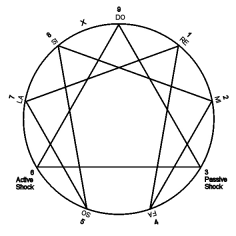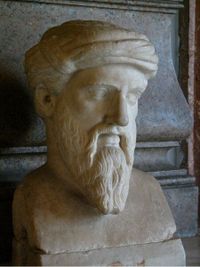


This dude Pythagorius is known for his theorum on the right triangle which is the basis for trigonometry. We don't hear much mention of his philosophy relating to light and sound waves, but it sure makes sense. Maybe if we can play harmonious music, it will affect the vibrations on both lower and higher levels. Whoah...I feel like I'm back in the 1960's.
The Pythagoreans lived in a colony and were subjected to all kinds of abstinences and physical exercises as a preparation for the extraordinary intellectual work which they accomplished. They were deeply concerned with rhythm, with movement, with the analysis of the octave, and with other apparently irrelevant subjects which are studied at Fontainebleau. In some respects the parallel is indeed almost absurdly exact. Pythagoras himself was a Greek who spent many years in Eastern Persia and Afghanistan, and who on returning to Europe established a school for the study and teaching of music and mathematics. He was indeed the founder of European mathematics, of the European theory of music, and of European astronomy. He taught the doctrine of re-incarnation before Buddha; he laid the foundations and solved the crucial problems of pure geometry 200 years before Euclid was born; and he described the earth as a sphere and a planet revolving with the other planets round a 'central fire', 2,000 years before Copernicus.
 The Enneagram
The Enneagram These mathematical relations are from the book "In Search Of The Miraculous" by P.D. Ouspensky

1/7=.142857142857142857142857142857142857142857
2/7=.285714285714285714285714285714285714285714
3/7=.428571428571428571428571428571428571428571
4/7=.571428571428571428571428571428571428571428
5/7=.714285714285714285714285714285714285714285
6/7=.857142857142857142857142857142857142857142
7/7=.999999999999999999999999999999999999999
The Pythagorean Theory of Music and Color

DO
RE
MI
FA
SOL
LA
SI
DO
The pythagorean theorum of color and sound points out that all wave lengths behave in the same manner. Just as sound naturally breaks up into 8 notes with the last being double the vibrations of the first, light breaks up into 8 colors in the same manner. In the case of light this can be seen in the rainbow. Sometimes you can see a double rainbow, or even faintly one more.
Ouspenski in his book "IN Search Of The Miraculous" relates mathematics to the philosophy of vibrations and explains in those terms how the notes of the octave are formed, and the two shocks are introduced as the frequency of the waves increase. This all relates to the enneagram.
In music these shocks are the notes formed by the bugle, which forms only four notes, the last being double the vibrations of the first. The native Americans have an instrument that is a string stretched on a bow that they swing in the wind. It too plays these notes. The same notes that are heard in Taps.
See also the teachings of Gurdjieff

H.e.a.v.y. stuff at 6am.
ReplyDeleteI think I need another cup of coffee to process this.
Person behind the Web Page,
ReplyDeleteI have studied and worked with the enneagram for many years. Most of my work has been
based upon Ouspensky's In Search of the Miraculous, and some experience in fourth way
groups.
I have gained some new insights into the enneagram which I would like to discuss.
BarbaraLea
This comment has been removed by a blog administrator.
ReplyDeleteThis comment has been removed by a blog administrator.
ReplyDeleteThis comment has been removed by a blog administrator.
ReplyDeleteArticle writing is also a fun, if you be familiar with after that you can write or else it is complicated to write.
ReplyDeleteMy web page http://xplayxslots.soup.io/post/287261455/A-Guideline-To-Educational-Video-Games-On
This comment has been removed by a blog administrator.
ReplyDeleteAw, this was an incredibly nice post. Taking the time and actual effort to create
ReplyDeletea great article… but what can I say… I procrastinate a whole
lot and don't manage to get nearly anything done.
my weblog; book auf ra :: www.rtkfriends.com ::